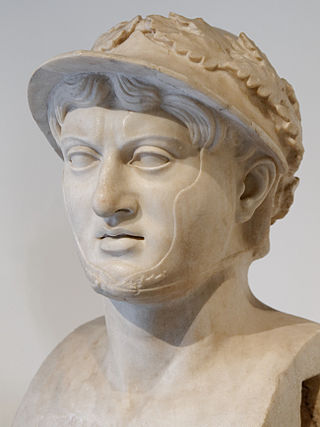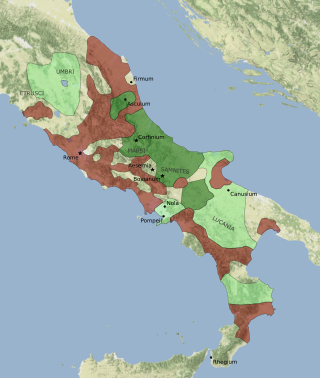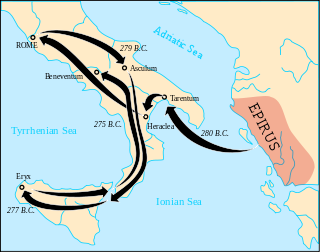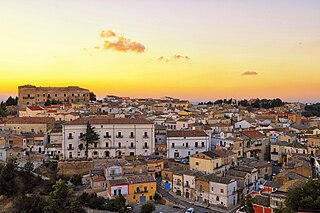80s BC is the time period from 89 BC – 80 BC.

The Appian Way is one of the earliest and strategically most important Roman roads of the ancient republic. It connected Rome to Brindisi, in southeast Italy. Its importance is indicated by its common name, recorded by Statius, of Appia longarum... regina viarum.

Pyrrhus was a Greek king and statesman of the Hellenistic period. He was king of the Greek tribe of Molossians, of the royal Aeacid house, and later he became king of Epirus. He was one of the strongest opponents of early Rome, and had been regarded as one of the greatest generals of antiquity. Several of his victorious battles caused him unacceptably heavy losses, from which the term "Pyrrhic victory" was coined.

The Social War, also called the Italian War or the Marsic War, was fought largely from 91 to 87 BC between the Roman Republic and several of its autonomous allies in Italy. Some of the allies held out until 87 BC.
From its origin as a city-state on the peninsula of Italy in the 8th century BC, to its rise as an empire covering much of Southern Europe, Western Europe, Near East and North Africa to its fall in the 5th century AD, the political history of Ancient Rome was closely entwined with its military history. The core of the campaign history of the Roman military is an aggregate of different accounts of the Roman military's land battles, from its initial defense against and subsequent conquest of the city's hilltop neighbors on the Italian peninsula, to the ultimate struggle of the Western Roman Empire for its existence against invading Huns, Vandals and Germanic tribes. These accounts were written by various authors throughout and after the history of the Empire. Following the First Punic War, naval battles were less significant than land battles to the military history of Rome due to its encompassment of lands of the periphery and its unchallenged dominance of the Mediterranean Sea.

Ascoli Piceno is a comune (municipality) and capital of the province of Ascoli Piceno, in the Marche region of Italy.
Gnaeus Pompeius Strabo was a Roman general and politician, who served as consul in 89 BC. He is often referred to in English as Pompey Strabo, to distinguish him from his son, the famous Pompey the Great, or from Strabo the geographer.

The Battle of Heraclea took place in 280 BC between the Romans under the command of consul Publius Valerius Laevinus, and the combined forces of Greeks from Epirus, Tarentum, Thurii, Metapontum, and Heraclea under the command of Pyrrhus, king of Epirus. Although the battle was a victory for the Greeks and their casualties were lower than the Romans, they had lost many veteran soldiers that would be hard to replace on foreign soil.

The Battle of Asculum took place in 279 BC between the Roman Republic under the command of the consuls Publius Decius Mus and Publius Sulpicius Saverrio, and the forces of King Pyrrhus of Epirus. The battle took place during the Pyrrhic War, after the Battle of Heraclea of 280 BC, which was the first battle of the war. There exist accounts of this battle by three ancient historians: Dionysius of Halicarnassus, Plutarch, and Cassius Dio. Asculum was in Lucanian territory, in southern Italy.

The Messapians were an Iapygian tribe who inhabited Salento in classical antiquity. Two other Iapygian tribes, the Peucetians and the Daunians, inhabited central and northern Apulia respectively. All three tribes spoke the Messapian language, but had developed separate archaeological cultures by the seventh century BC. The Messapians lived in the eponymous region Messapia, which extended from Leuca in the southeast to Kailia and Egnatia in the northwest, covering most of the Salento peninsula. This region includes the Province of Lecce and parts of the provinces of Brindisi and Taranto today.
The Battle of Asculum was fought in 89 BC during the Social War between Rome and its former Italian allies. The Romans were led by C. Pompeius Strabo, and were victorious over the rebels. The future Consul Publius Ventidius was said to have been captured as a youth at this battle and displayed in a Triumph at Rome.
The treaties between Rome and Carthage are the four treaties between the two states that were signed between 509 BC and 279 BC. The treaties influenced the course of history in the Mediterranean, and are important for understanding the relationship between the two most important cities of the region during that era. They reveal changes in how Rome perceived itself and how Carthage perceived Rome, and the differences between the perception of the cities and their actual characteristics.

Ascoli Satriano is a town and comune in the province of Foggia in the Apulia region of southeast Italy. It is located on the edge of a large plain in Northern Apulia known as the Tavoliere delle Puglie.

The Battle of Canusium also known as the Battle of Asculum was a three-day engagement between the forces of Rome and Carthage. It took place in Apulia during the spring of 209 BC, the tenth year of the Second Punic War. A larger Roman offensive, of which it was a part, aimed to subjugate and to punish cities and tribes that had abandoned the alliance with Rome after the Battle of Cannae, and to narrow the base of the Carthaginian leader, Hannibal, in southern Italy.
Titus Afranius, Afrenius, or Lafrenius, who was not a Roman, was one of the leaders of the Italian confederates in the Social war in 90 BC. At Mount Falerinus he united with Judacilius and Publius Ventidius Bassus and defeated the legate Pompeius Strabo, and pursued him into Firmum, after which the three went their separate ways. Afranius besieged Strabo within the walls of the city. Strabo, on hearing another army was approaching, sent out Publius Sulpicius Rufus to attack Afranius' force from behind while he mounted a frontal assault. The battle proceeded evenly until Sulpicius managed to set fire to Afranius' encampment. Afterwards Afranius' forces fled to Asculum without a leader, as he had fallen at some time during the battle.

The name Picentes or Picentini refers to the population of Picenum, on the northern Adriatic coastal plain of ancient Italy. Their endonym, if any, is not known for certain. There is linguistic evidence that the Picentini comprised two different ethnicities: a group known to scholars as the "South Picenes" were an Italic tribe, while the "North Picenes" appear to have had closer links to non-Italic peoples.
Lucius Manlius Torquatus was a consul of the Roman Republic in 65 BC, elected after the condemnation of Publius Cornelius Sulla and Publius Autronius Paetus.

The Berones were a pre-Roman Celtic people of ancient Spain, although they were not part of the Celtiberians, they lived north of the Celtiberians and close to the Cantabrian Conisci in the middle Ebro region between the Tirón and Alhama rivers.









